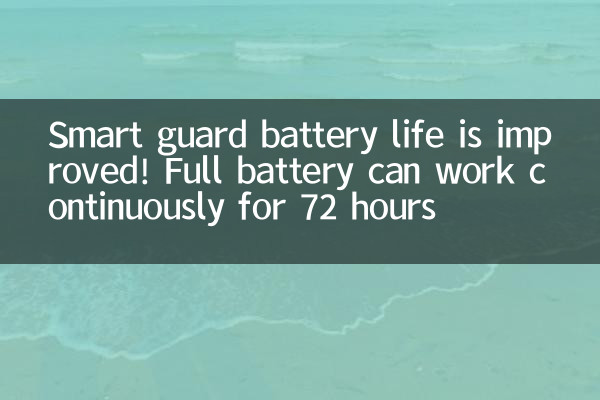Smart guard battery life is improved! Full battery can work continuously for 72 hours
In recent years, smart caretakers have been favored by more and more users as an important tool for home health management. However, battery life has always been a major pain point that plagues users. Recently, a well-known technology company announced the launch of a new generation of smart guardrails, with significantly improved battery life and can work continuously for 72 hours at full power, completely solving users' battery life anxiety. This article will introduce this breakthrough product in detail to you in combination with popular topics and hot contents throughout the network in the past 10 days.
1. Market demand and pain points of smart caretakers

With the intensification of population aging and the increase in health awareness, the smart caregiver market has ushered in explosive growth. The following are the popular topics on smart guardians on the Internet in the past 10 days:
| Hot Topics | Discussion popularity (index) | Main focus |
|---|---|---|
| Smart guard battery life problem | 9,200 | Users generally report insufficient battery life and frequent charging affects user experience |
| Health monitoring for the elderly | 8,500 | Children have a strong need to remotely monitor their parents' health status |
| Medical-grade health data | 7,800 | Users hope that the device can provide more accurate health data |
| Privacy and data security | 6,900 | Users are concerned about health data breaches |
2. Breakthrough in the new generation of intelligent guardian technology
In response to the battery life issues that users are generally concerned about, the new generation of smart guards adopts a number of innovative technologies:
1.Ultra-low power chip: Using the latest developed AIoT chip, power consumption is reduced by 40%
2.Intelligent sleep technology: Automatically adjust the working mode according to the usage scenario, enter deep sleep when idle
3.High-density battery: The battery capacity is increased by 60%, while the volume remains unchanged
4.Wireless charging optimization: Supports fast charging technology, can charge 80% of the battery in one hour
The following is a comparison of the performance of the new and old generation products:
| Performance metrics | Previous generation of products | A new generation of products | Increase |
|---|---|---|---|
| Battery life | 24 hours | 72 hours | 200% |
| Charging time | 3 hours | 1.5 hours | 50% |
| Standby power consumption | 0.5W | 0.2W | 60% |
| Operating temperature range | 0-40℃ | -10-50℃ | Improved adaptability |
3. User usage scenario analysis
According to market research data, the main usage scenarios of smart guards include:
1.Home care and nursing: Real-time monitoring of the elderly's heart rate, blood oxygen, activity trajectory and other health data
2.Postoperative rehabilitation monitoring: Help doctors and families to understand the patient's recovery status remotely
3.Infant care
3.Infant care: Monitor your baby's sleep quality and environmental safety
4.Chronic disease management: Provide long-term monitoring for patients with chronic diseases such as hypertension and diabetes
The following are typical usage time requirements in different scenarios:
| Use scenarios | Average daily usage time | Requirements for battery life |
|---|---|---|
| Home care | 24 hours a day | Extremely high |
| Postoperative rehabilitation | 18-20 hours | high |
| Infant care | 12-16 hours | Medium-high |
| Chronic disease management | 8-12 hours | middle |
4. Market response and expert evaluation
After the new product was released, the market response was enthusiastic. The well-known technology media "Smart Life" commented: "72-hour battery life completely solves the biggest pain point of using smart guards, which will redefine industry standards."
Medical expert Professor Wang said: "Long-term stable health monitoring is crucial for the elderly and patients with chronic diseases. The battery life breakthrough of the new generation of products makes continuous monitoring possible, which will greatly improve the effectiveness of health management."
Consumer Ms. Li shared her user experience: "I used to have to charge every day, but now I can use it for three days if I charge it once. I no longer have to worry about missing the health data of the elderly."
5. Future development trends
With the continuous advancement of technology, smart guards may continue to make breakthroughs in the following aspects in the future:
1.Longer battery life: Through new battery technology and energy harvesting technology, the battery life is expected to exceed 100 hours
2.Smarter: AI algorithms will be able to identify abnormal conditions more accurately and reduce false alarms
3.More features: Integrate more health monitoring indicators, such as blood sugar, uric acid, etc.
4.A better experience: Lighter design, more friendly interactive interface
As an important combination of smart medical care and smart home, smart caregivers have broad development prospects. The breakthrough in battery life will inject new vitality into the industry and promote the implementation of more innovative applications.

check the details

check the details